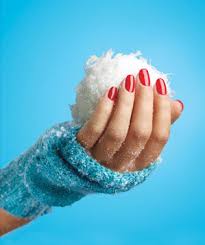Our hands are always on display. We use them constantly in our work and even in conversation. The hands begin to show neglect and ageing earlier than most other parts of the body. The hands and nails also come in contact with soaps and detergents, making them dry and rough.
Protect your hands by wearing rubber gloves for your washing chores. Massage a cream afterwards on the hands, nails and the skin around the nails. Massage the hands at night with a good nourishing cream.
Apply the cream on the back of the hand. This is the area that is prone to early wrinkling. Work down each finger, starting from the tip. Use tiny circular movements on the joints of the fingers. Massage the back of the hand, using strokes moving from the fingers towards the wrist.
For very dry hands and nails, mix together one tablespoon almond oil, one tablespoon sesame seed (til) oil, one teaspoon wheatgerm oil. Apply daily and massage it into the skin. Massage around the nails too, in order to soften the cuticles.

A traditional home pre-bath treatment is to mix besan (gram flour) with a little milk or curd and a pinch or haldi (turmeric) into a paste. Apply the paste on the hands. After 20 minutes, dampen with water and rub the paste gently on the skin and wash it off.
For dry and dark hands, take 2 tablespoons sunflower oil, two tablespoon lemon juice and three tablespoon coarse sugar. Mix together till it becomes a paste. Apply and rub into hands. Wash off after 15 minutes. You can do this three times a week.
Take fresh orange peels, pierce them with a fork. Rub the peels on the hands to brighten the skin.
A weekly manicure keeps nails in good condition. For a home manicure, first remove old nail varnish. To cut nails, use a nail clipper. Then shape them with an emery board. File in one direction only. Soak the hands in warm water for five minutes after adding a few drops of shampoo.
Use a soft brush to clean nails. Wash the hands. Then apply cream and massage nails and skin. Push cuticles back gently using a cotton bud. Keep them soft and smooth, otherwise, they stick to the nail and get dragged as the nail grows.
Avoid cutting cuticles or cleaning nails with sharp instruments. Use a cotton bud to clean under the nails. Then apply nail varnish, using three long, smooth strokes, from the base of the nails to the tip. Two coats of colour will be needed for an even finish.
Sometimes, the nails acquire a yellowish tinge, due to wearing nail polish constantly. Sun-exposure and some pastel colours can leave a yellowish tinge. For protection, use a clear, transparent nail polish as a top coat. UV resistant top coats are also available. To protect the nails apply a transparent base coat first and then apply the colour of your choice.
To get rid of the yellowish tint on the nails, scrape the surface of the nail with the finest-grain side of an emery board, so that the nail is not damaged. Then apply UV-resistant or clear polish for protection. The nails can also be “buffed” or rubbed with a piece of chamois leather.
If you have brittle nails, include adequate protein and calcium in your diet. Take skimmed milk, yogurt, cottage cheese, fish and sprouts. Follow a 10-day programme of taking gelatin. Dissolve one teaspoon gelatin in a little boiling water. Cool the water and add it to fruit juice. Have this daily for 10 days.